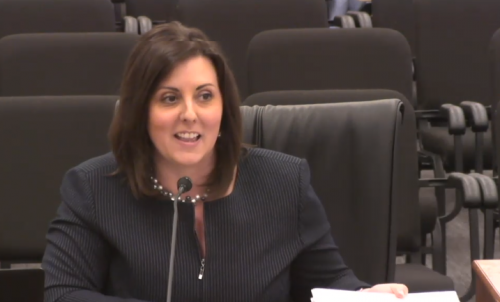SC tax reform should begin and end with one thing: fairness
Drawn from testimony given to the Senate Finance Taxation System Review and Reform Subcommittee Jan. 16, 2019.
Palmetto Promise first started on this journey over three years ago, because we believe that no other policy discussion currently before the General Assembly could have such direct and immediate impact on the future prosperity of the people of our state.
The mission you are embarked on here has the potential to transform the economy – and future – of millions of South Carolinians.
I also want to say at the outset that Dr. Gunnlaugsson is very modest. But I want you to know that what you heard condensed into one short, polished presentation is built on three years of painstaking research and advanced data analysis by one of the sharpest economic minds in this state. Dr. Gunnlaugsson doesn’t just talk about policy in theory: She led the team that developed a data-based solution to make South Carolina’s Unemployment Insurance Trust Fund solvent again after the 2008 crash. The caliber of her work is tested and proven.
The window of opportunity that she has outlined is truly revolutionary, because it is the only plan I am aware of that is built on and tested by actual data-modeled impacts.
At times, talking about tax reform can seem a bit like going to a fancy restaurant on a budget and looking at a menu with no prices listed. If you’re on a budget, you’ll probably end up washing dishes to pay for your dinner if you don’t ask for the price. And it’s much the same with tax reform: You need to know the actual impact on real people to make informed decisions.
Which brings us to the first big idea: Tax reform must begin with the end in mind. The key question: Who most needs relief?
I will not position myself to you today as a tax policy guru: You have already heard from the real one. But having grown up in a working-class family – my father owned his own construction business most of my childhood – I have seen firsthand the immense strain and stress that taxes place on small business owners.
Tax reform is undoubtedly a complex issue, and there are many lenses through which you can view the huge number of inequities contained in our current code.
Our lens: What is good for the “little people” of our state? Who are they?
- Average, hardworking individuals who are trapped in the highest marginal income tax rate in the Southeast.
- Homegrown small businesses that, according the U.S. Small Business Administration, represent at least 46 percent of employment in this state. And especially in rural areas – where they may likely never see a major corporation relocate into their backyard – these are the businesses that form the community backbone and, if unleashed to grow, could create a rural renaissance.
- Low-income families who pay a disproportionate share of their income in a high sales tax rate.
- Families who can’t afford to buy a home, or small business startups who pay higher rent because of unequal treatment of property.
And the list goes on. These are the people who don’t have money to hire someone to lobby for the exemptions or sweet incentive packages that, incidentally, further erode our tax base and place a bigger and bigger burden on the backs of those who can least afford to pay it.
Next, we must weigh the risks and rewards of the opportunity. As we see from North Carolina’s example, the obstacles to reform are daunting but not insurmountable.
U.S. Sen. Thom Tillis, who was speaker of the North Carolina House when they passed significant tax reform, wrote in the Wall Street Journal:
“State revenue has increased each year since tax reform was enacted, and budget surpluses of more than $400 million are the new norm. North Carolina lawmakers have wisely used these surpluses to cut tax rates even further for families and businesses, to increase education funding, to raise teacher pay, and to replenish the state’s rainy‐day fund.”
All this sound exactly like the needs we’re discussing here in South Carolina. Senator Tillis doesn’t pull punches about how hard it is to get to reform, but as he says, the reward is worth the hard work. And for North Carolina taxpayers, the rewards keep coming:
As of Jan. 1 this year:
- North Carolina’s personal income tax rate fell from 5.49 percent to 5.25 percent.
- The standard deduction, or “zero tax bracket,” for families filing jointly increased from $17,500 to $20,000, and from $8,750 to $10,000 for individuals.
- Corporate tax rate fell from 3 percent to 2.5 percent – the lowest rate in the nation.
- North Carolinians will save about $380 million in the 2018-2019 fiscal year, $780 million in 2019-2020 and $810 million in 2020-2021.
- North Carolina has added a whopping 100,000 jobs in 2018, with rural areas growing as well as suburban and urban.
Economic growth, increased state revenue and continued rate reductions that benefit real working families are happening in North Carolina. How did it happen? Again, quoting Senator Tillis, “While heated debates occurred during the negotiations, lawmakers always pulled themselves back to shared principles.”
What are those shared principles? Certainly, fundamentals of good tax policy: a low tax on a broad base. But the most important principle: fairness for all.
Principled tax reform will not advantage the powerful and well-connected over the average citizen, “the little guy.” We have seen all too clearly recently the fallout of what happens when the big write legislation to benefit the big.
The ultimate benefits of fairness? Predictability and stability that will help us to weather economic downturns and fulfill our obligations. And using smartly constructed phase-ins and tax triggers, as Dr. Gunnlaugsson discussed, will help us follow North Carolina’s example to keep cutting taxes as revenue targets are exceeded.
Putting our system on a stable and fair foundation is how we ultimately get to the tax relief that so many of our citizens need.
We aren’t suggesting that what we have presented here today is the only way to achieve fairness, stability and growth. Rather, it is meant to show what is possible. And to show what can be done in a way that, first and foremost, creates fairness and opportunity for hardworking individuals and small businesses in our state – who are getting hammered by our current code.
In summary, our research shows a clear window of opportunity. We are now in a position to fix income and sales taxes in a way that is thoughtful, phased-in and minimizes the differences between the dreaded “winners and losers.”
As Dr. Gunnlaugsson stated, there is no simple fix for property taxes. And to be clear, Palmetto Promise Institute is not advocating for hiking taxes on homeowners. I would suggest that if we are serious about making property tax relief a priority, the General Assembly must look to capture some new recurring streams of revenue into something along the lines of a “property tax reform and relief fund.”
We appreciate the difficulty of the work before you. This will take courage, good communication and access to expertise. And I want you to know that we stand ready to help with the only tool that allows competing models to be tested for actual impact.
We are confident that tax reform – done right – will benefit everyone. This is not the zero-sum game between old and young, big and little. The fact is, businesses – whatever their size – are looking for an environment that is fair, competitive and predictable. The plan Dr. Gunnlaugsson has presented to you today would create that environment.
But without question, our first focus must be on creating a system that is the most fair for the most people. A mentor recently sent me a quote from Ray Dalio, one of the world’s most successful investors, and incidentally, a South Carolina property owner, that has stayed with me: “Know where the line is and be on the far side of fair.”
Pursuing that shared principle of fairness when the discussions get tough is how we will get to the tax system that creates fairness for individuals, stability to fund our promises and economic growth that unleashes the opportunities of the future.





